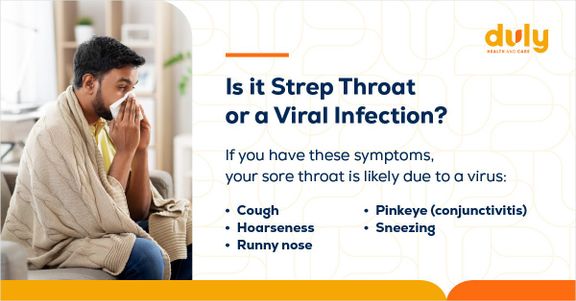You’ve woken up with a dreaded sore throat. A few hours later, you notice that the back of your throat is red and swollen. And, you’ve developed some suspicious-looking white spots on your tonsils. You’re wondering — what could be causing this?
If you have a sore throat, a virus is likely the culprit since most sore throats stem from viral infections. But while viruses cause the majority of sore throats, strep throat is caused by the bacteria group A Streptococcus (group A strep).
Both viruses and strep throat can cause symptoms in addition to a sore throat. Some of these symptoms overlap. For example, those white patches on the back of your tonsils (the lumps of tissue at the back of your throat that help fight infection) can be a sign of either a virus or strep throat.
However, cold-like symptoms, such as cough or runny nose, are telltale signs that the sore throat is caused by a virus.

When Strep Throat causes Sore Throat
Strep throat can be very painful, but the infection itself is usually pretty mild. Besides sore throat, you may also experience symptoms like fever, pain while swallowing, swollen lymph nodes at the front of your neck, or red spots on the roof of your mouth. Children, especially, may also have stomach pain, headache, nausea, or vomiting.
Even though infections are mild, it’s critical to be treated with antibiotics. Untreated, the bacteria causing strep throat could travel throughout the body and cause complications like ear or sinus infections.
If you have a sore throat, contact your primary care provider or visit a Duly Health and Care Immediate Care Center to learn about testing and treatment options.
Find Immediate Care near you >
When Viruses cause Sore Throat
With strep throat, it’s easy to know why your throat is sore — if you test positive for it, the mystery is solved. Your sore throat came from bacteria.
Viruses make it a little more tricky. That’s because there are a whole host of viruses that can bring on a sore throat, including:
Common Cold
It could come down to a plain old common cold. A cold itself isn’t a virus — it could be the result of any one of more than 200 different viruses. Most often, colds are from rhinoviruses.
Certain cold symptoms, like a runny nose or cough, can last up to 14 days.
The Flu (Influenza)
Flu comes from the influenza virus. It can cause many symptoms, like fever, cough, body aches, and sore throat. Fortunately, most cases of the flu go away within a few days to less than two weeks. While there are several antiviral medications available, most people can recover without treatment.
However, the flu can sometimes cause serious complications, like pneumonia. In severe cases, the flu can even be life-threatening. The best way to reduce your chance of getting the flu or getting a severe case of it is to get your annual flu vaccine.
Also Read: When is the Best Time to Get a Flu Shot This Year?
COVID-19
A sore throat is among the vast array of symptoms caused by COVID-19 (caused by the SARS-CoV‑2 virus). In fact, it was one of the first known symptoms back in the beginning of the pandemic.
Most cases of COVID-19 are mild and don’t require treatment. But as we’ve all seen in the past few years, there are times when COVID-19 can lead to long-lasting effects (long COVID) or be severe enough to require hospitalization or cause death.
Coxsackievirus (Common in Children)
Certain types of coxsackieviruses cause sore throat-inducing infections, like hand, foot and mouth disease. Hand, foot, and mouth disease is very common in infants and children, usually in those younger than 5 years. Sore throat, along with fever and runny nose, are generally the first symptoms to appear. The next sign is a rash with tiny blisters that shows up in the mouth or on the fingers, palms of the hands, soles of the feet, or buttocks.
In most cases of coxsackievirus, children recover on their own within 7 to 10 days, with no lasting problems.
What About Tonsillitis?
“Tonsillitis” is another term you might hear when talking about what causes a sore throat. Tonsillitis is when your tonsils are swollen. This swelling is usually due to a viral infection, but it can sometimes be from a bacterial infection, like strep throat.
How to Treat a Sore Throat
Finding out the root cause of your sore throat is the best way to get the most effective treatment. If your provider does not prescribe antibiotics or antiviral medications, you can still get some relief from over-the-counter medications, like acetaminophen, or lozenges.
When to See a Doctor For a Sore Throat
Finding out the root cause of your sore throat is the best way to ensure that you’re getting the most effective treatment. Reach out to your provider to see if you should take further steps, like getting tested for strep throat or COVID-19.
Find Primary Care near you >
Health Topics:








